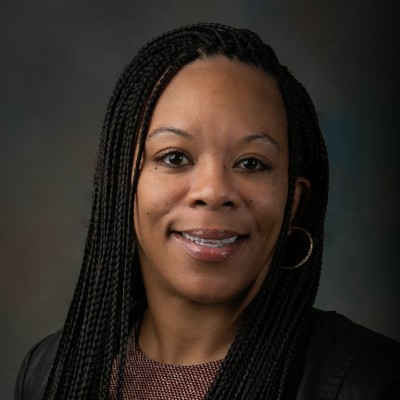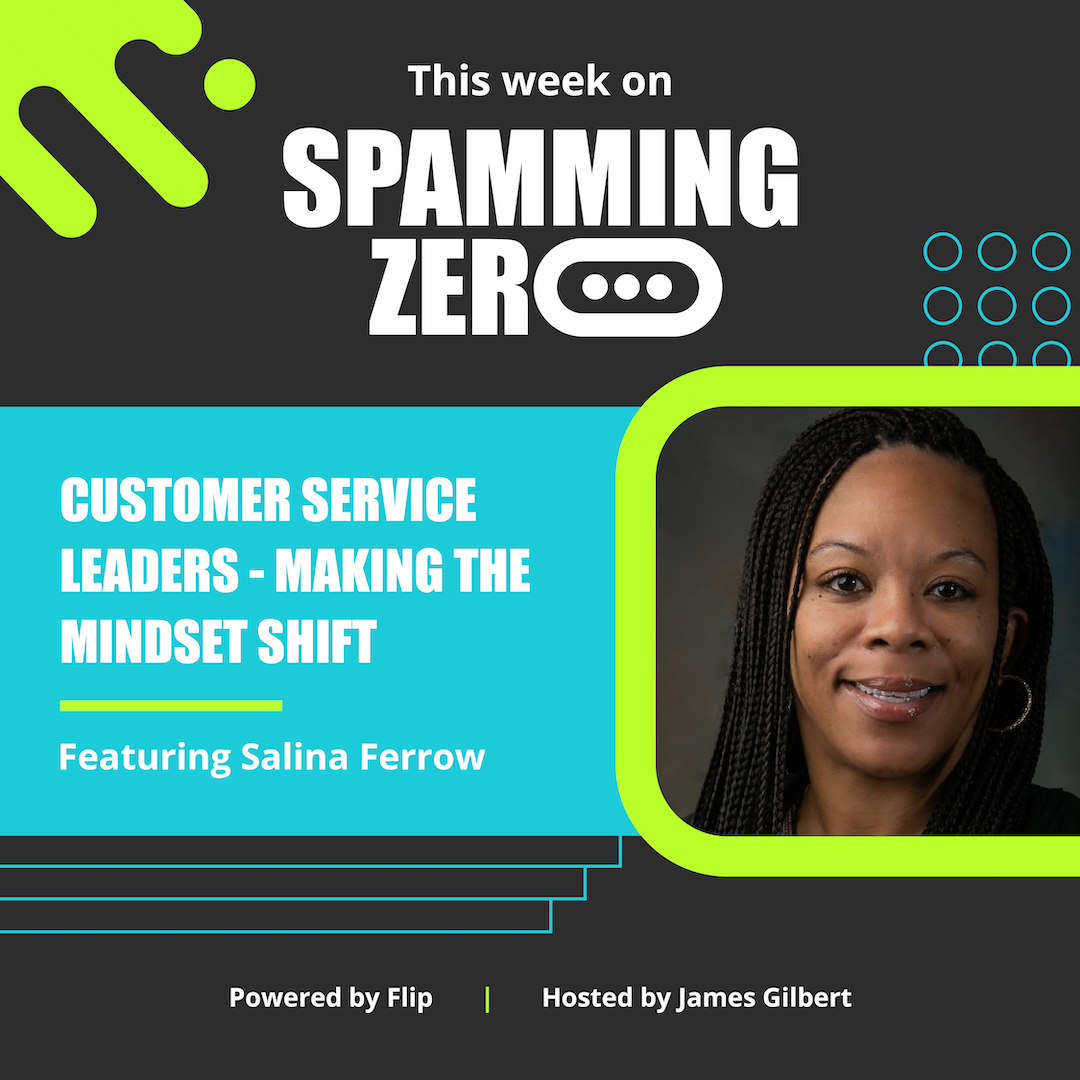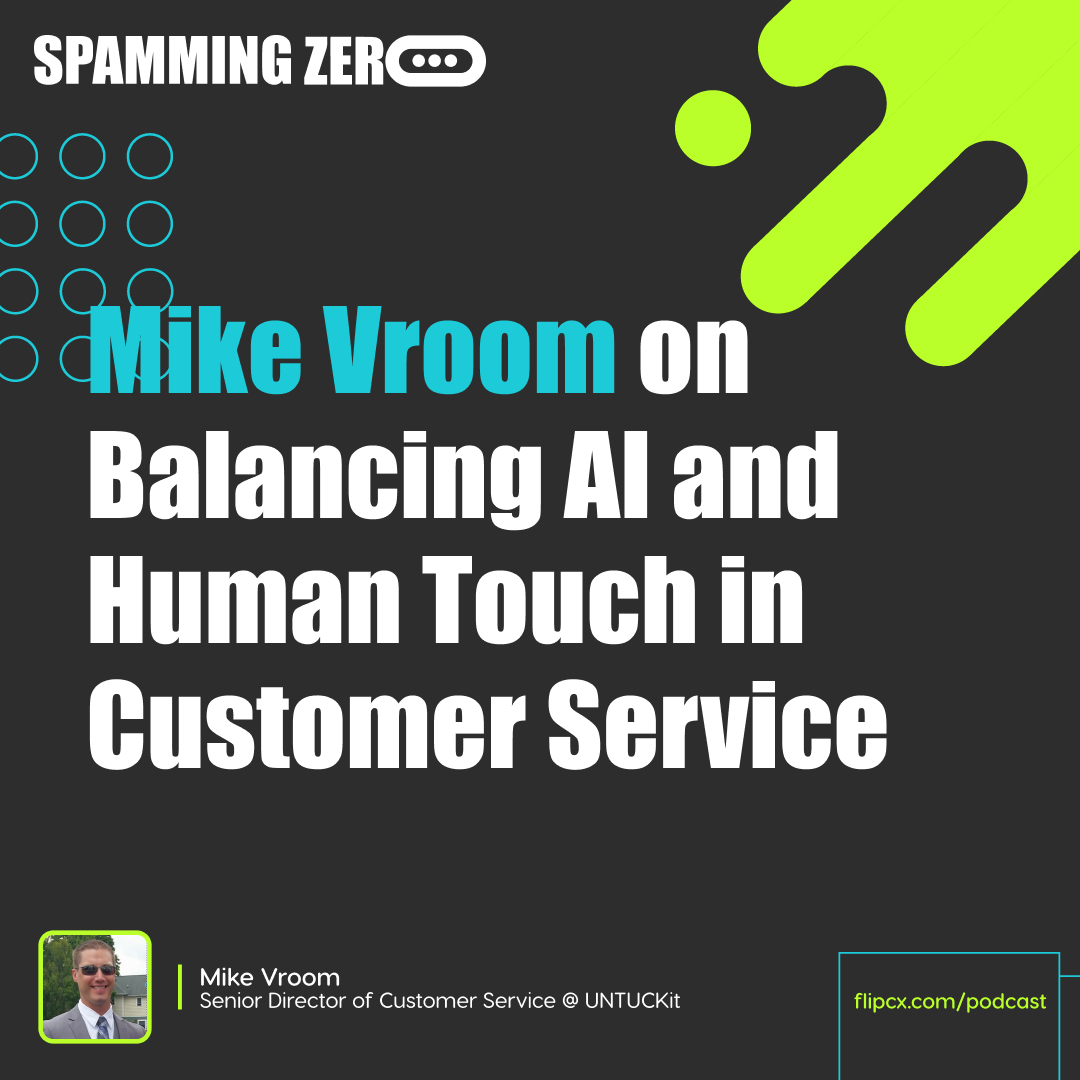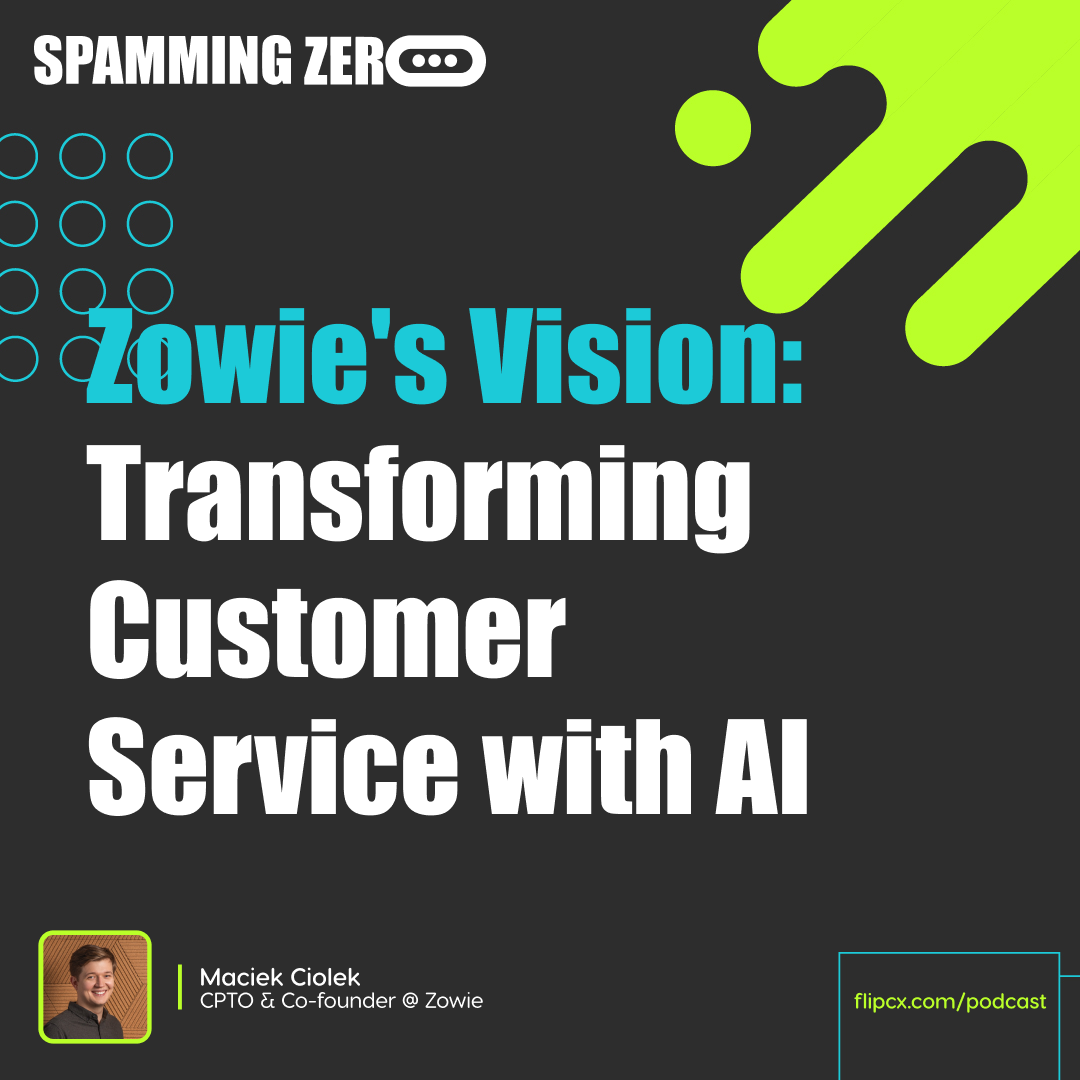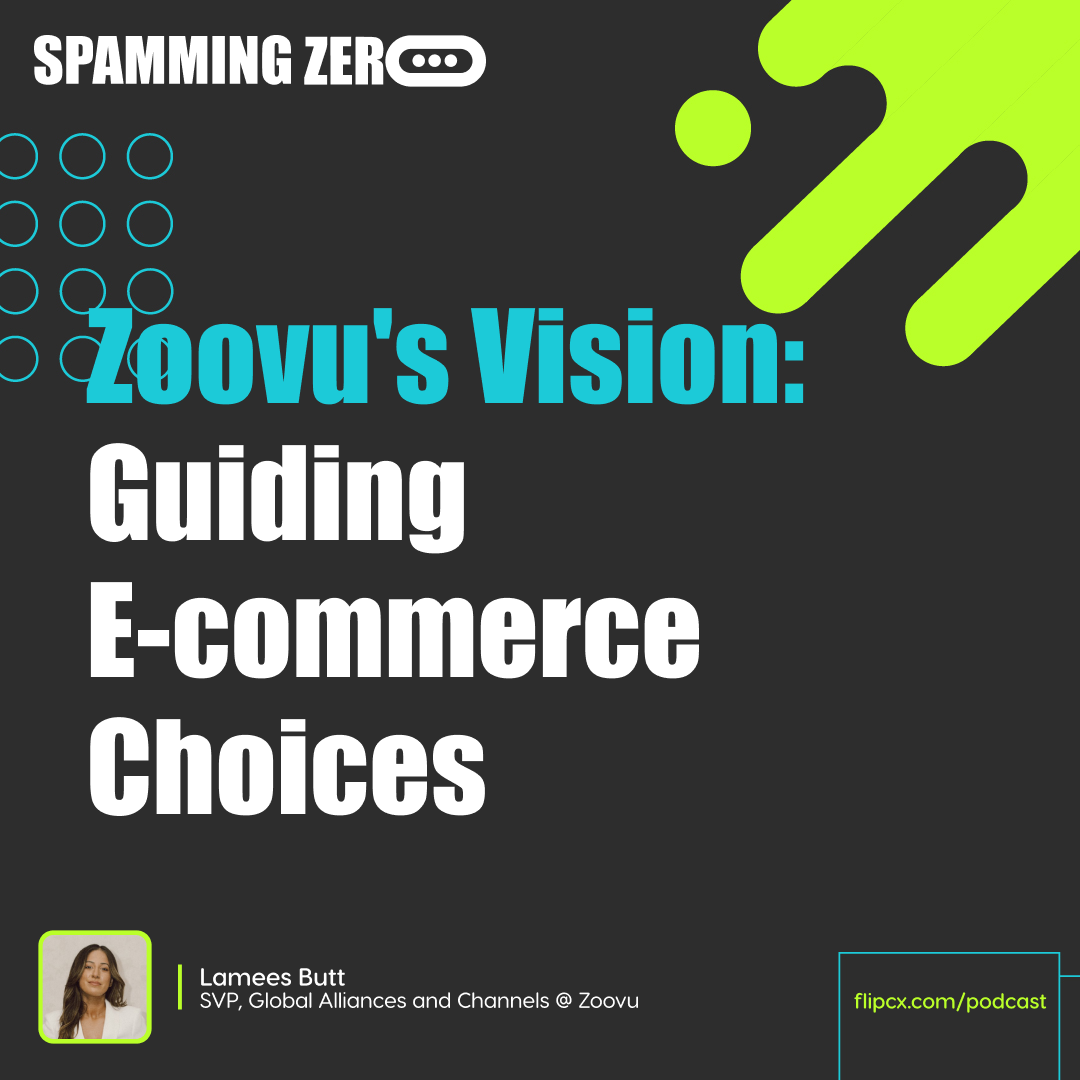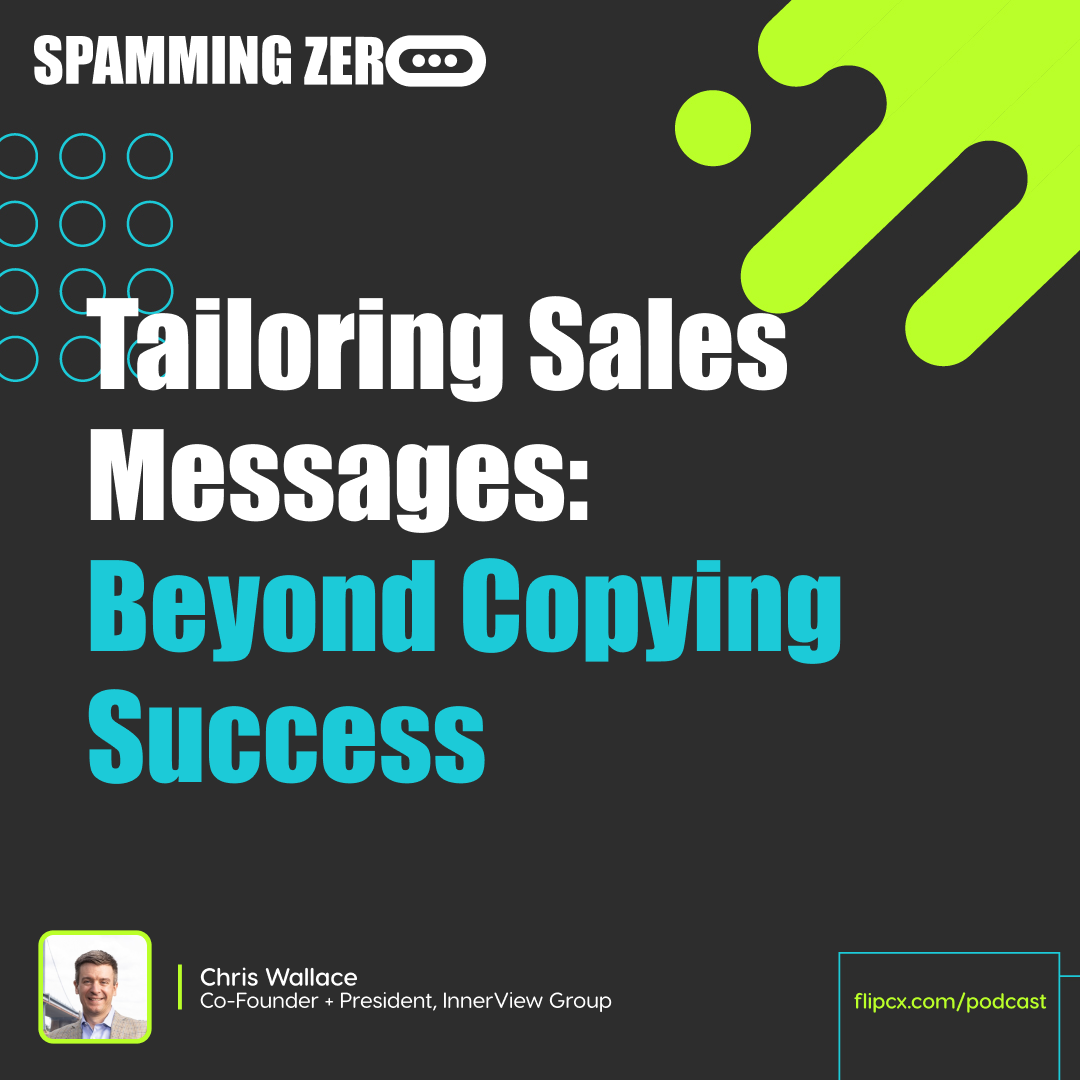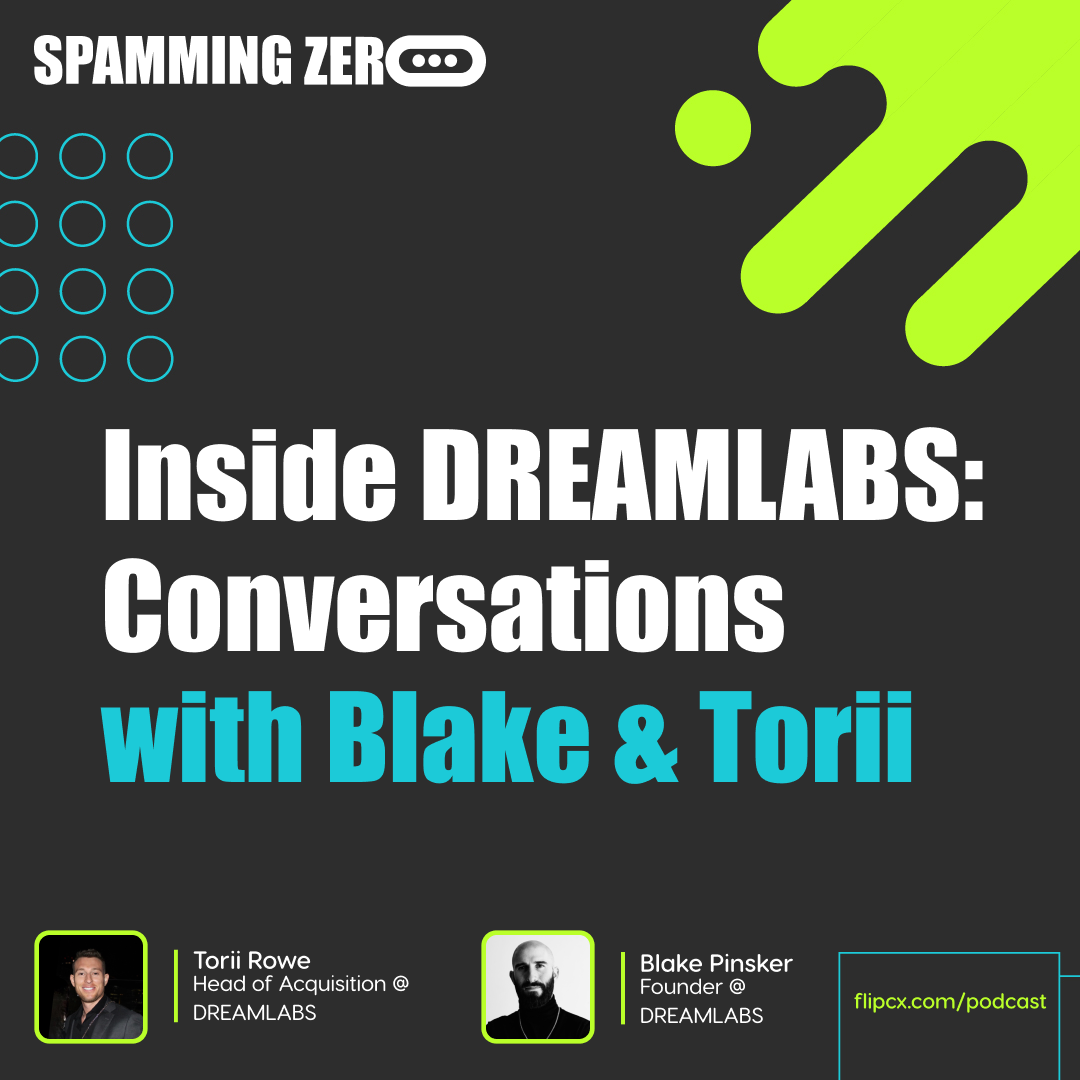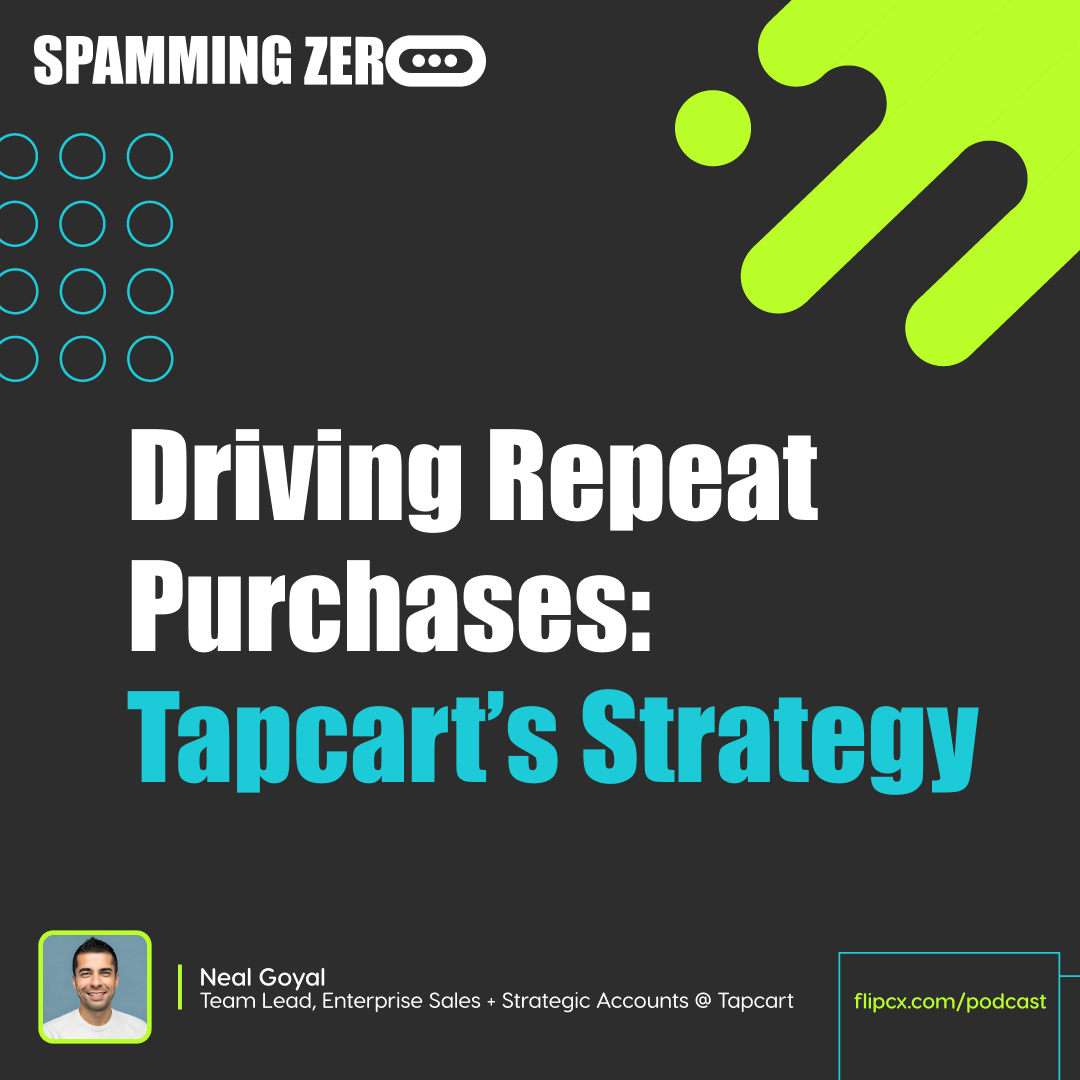Episode 41: Customer Service Leaders - Making The Mindset Shift
- 0.5
- 1
- 1.25
- 1.5
- 1.75
- 2
James Gilbert: Hey, everybody. Welcome to another episode of Spamming Zero. This month's sponsor of the podcast is Gorgias. If you're not familiar with Gorgias, Gorgias is a help desk, but it's specifically meant for e- commerce brands or DDC brands. I love, love, love, love their mission. Listen to this, " We believe that the next version of commerce should be more open and anyone should be able to be a part of it as a merchant or a customer. We believe decentralized commerce is better for everyone." Their core values, " Maximize your impact customer first, strive for excellence, take extreme ownership and 100% honest." I love what they do. Gorgias is one of our favorites. They work with brands like Steve Madden, Olipop and others. Too often customer service gets a bad rap and Gorgias helps make sure that that gets a better wrap. Here's a testimonial from a CEO and founder at Darn Goody Yarn. " Gorgias gives us a holistic view of our customers. This way we can provide them with fast and personalized help." Love it. Check them out. If you're not familiar with their website, it's gorgias. com. Check out Gorgias. I'm James.
Brian Schiff: And I'm Brian.
James Gilbert: And this is Spanning Zero. Hey everybody. Welcome to another episode of Spanning Zero. I'm your host, James Gilbert. Today we are joined by the CEO of Contribution Consulting, LLC, her name is Salina Ferrow. Welcome to the show, Salina.
Salina Ferrow: Well, thank you, James. It's a pleasure and an honor to be here today.
James Gilbert: Yeah, I'm excited to have you. I saw some of your stuff on LinkedIn and I was like, " Ah, I've got to get her on the show." Talk to me a little bit about your background. Give the listeners, why should they listen to you?
Salina Ferrow: I know a little bit above a little bit, but I do know contact centers. So I have been in the contact center industry for well over 30 years. I have a running joke that if I'm ever asked to do anything outside of contact centers, I'm probably not going to do it very well. I started out in telemarketing and working for my mom, believe it or not, I answered phones for her and my dad. They had a charter bus company where they would charter folks back and forth from California to Las Vegas.
James Gilbert: Oh, wow.
Salina Ferrow: So my role was to answer the phone and take the reservations and make sure that my father knew where to go and pick the people up at. So I have been doing phones my entire life and I really like it. I really do. I've been in the contact center world for a minute and over 30 years of experience. My last biggest role was at the postal service. Lots of responsibility there. Over a hundred million calls a year. I think we had 16 or something like that, locations as far as contact centers. So it was a lot, it was a big job, but it was so much fun and I learned a lot. And I transitioned to contribution consulting, where now I focus in on looking at operations, going into contact centers and just doing an operational assessment and then sharing and giving feedback on recommendations. Here's what you can do to improve your customer experience or your employee experience. So I really, really enjoy doing it if you can't tell already. And would love to continue to do more and more and help other companies change and improve their customer and employee experience.
James Gilbert: Here's the real question. If you were answering phones for your mom and dad's business, how much was your mom and dad actually tapping into the insights that you were getting? That's the real question.
Salina Ferrow: It's a great question. And here's the funny thing. My mom worked for McDonald Douglas, the aircraft company in customer service. So her expectations were already set as to what it was she was expecting from me when I was answering the phones. So it's like, " Salina, say it this way, write it down and follow up and call her back." It was like, " Oh." Back then I was probably 14 looking at her. " I don't work for you." Well, actually I did. So it was fun.
James Gilbert: I think that's something I'd love to get your thoughts on. While we're on that topic is, there is a plethora of information and data that exists with the people that are answering the phones and the people that are answering chat, whatever channel they may be answering and serving people in. I consider it the holy grail of untapped data. That's honest and truthfully the truth because it's so much.
Salina Ferrow: Absolutely.
James Gilbert: What's your take on how businesses can tap into that data more and what foundational pieces do they need to put together in their contact center to make sure it happens?
Salina Ferrow: I always say that the contact center is a hidden gem. I just think that organizations sometimes forget that we have all the data, the touchpoints. That's us. We know what customers want, we know what customers don't want, and we have the data. We have the insights. Not only are we answering the phones and getting feedback from the agents, we also have the data that goes along with it that allows us to dig into the data and really try to start understanding what is the true customer experience, not just from the contact center perspective, but we get a chance to see and hear about it from the entire organization's perspective. So I think that that's the missed opportunity, is that organizations are not going to their contact centers first before they start developing things. I've always had a saying is that, " Don't develop until you've talked to the care centers." And I know sometimes people thought that was arrogant of me to say that, but it wasn't about that. It was about let's dig into the data and let's make sure that whatever this is you're getting ready to develop aligns with what we're hearing the customers are saying they want. So I think it's a missed opportunity sometimes within organizations.
James Gilbert: Love that. Let's put you in a consumer role for just a second.
Salina Ferrow: Absolutely.
James Gilbert: You buy stuff, right?
Salina Ferrow: I do.
James Gilbert: And you have to call support and service just like anyone else.
Salina Ferrow: Yes.
James Gilbert: Now, every person that I've ever talked to that has ever worked in the contact center space or has been a customer service agent has a lot more empathy for the person on the other line, typically. I'm assuming making the great assumption that you're like that because you seem like a very genuine human being. So that being said, what in the customer service world, whatever it is, what takes you to a level 10? Anything can get anyone there.
Salina Ferrow: Yes.
James Gilbert: What does it for me is when I'm in a channel and I'm trying to get my answers and I can't get my answers, and then there's not a channel like phone, it drives me nuts so much. I just want a phone number because it's the quickest path to resolution typically for me in any situation. So what drives you nuts?
Salina Ferrow: There's a few, but I would say probably the biggest thing for me is when I contact a company that I've been contacting consistently and they don't know me, I just think we have a responsibility to know our customers. It's funny, I used to tell my team this, " I don't pay my bills online." I am still the person who takes all my bills and sit down on a Sunday and call. I do that because one, that's the business that I'm in. But some of it is curiosity. Some of it is just I want to know if they've made any changes to their IVR. Do they know me anymore now than they did yesterday? And I think a pet peeve of mine is when I call, oftentimes the only information that they still have on me is my credit card number or my bank account number for me to make the payment. Is that all I am to you is the payment. There's more to our relationship as me being the consumer and you being the organization, and I think we miss those opportunities. So for me, I think it's just that lack of knowing who I am or knowing more about me than just my credit card number or my bank account number. That's kind of a pet peeve of mine.
James Gilbert: I've actually never thought of it in that way. You're right though. They always know your payment information. Wow.
Salina Ferrow: Yep.
James Gilbert: I don't know why I've never put that two and two together there. But you are.
Salina Ferrow: I'm always looking at the contact centers in a, I guess different kind of way. And as the consumer, I always try to think about what is it that I would expect? What do I want? What would make this experience be better? And sometimes I'm paying my bills and writing things down like, " That wasn't great. Why did they say that? Well, if they would've just put that message in the IVR, wouldn't never had to wait to talk to an agent. That's an answer you could have just gave me while I was waiting." So I'm always looking at it from that perspective.
James Gilbert: All right. So I want to get to the main topic of discussion here, which is something that you had mentioned, it's your hot take right now, and that's this leadership mindset shift. I want to dive into that, talk to me a little bit about what does this mean?
Salina Ferrow: What I'm starting to hear a lot as I'm talking to leaders is we are operating with the same mindset that we used to operate with 20, 30 years ago. And things have changed. People have changed, technology has changed, and we have a responsibility to change as well. That oftentimes takes shifting the mindset, changing the way you think about things now is very different the way you was thinking about it previously. And so I think it's all about making sure that we shift that mindset, becoming more proactive. A lot of times we become so reactive. Everything is, " Oh, there's a fire," and we take off running, and so we lose some things. But if a leader would shift the mindset and say when there's a fire, because we deal with those all the time, we look at the fire from a different perspective of its being a fire. It's about shifting the mind to find the positive in the issue and knowing that yes, you're going to have to build a strategy to fix it. I'm not saying don't do the work. I'm just saying, see the work that needs to be done from a slightly different perspective than the one that you've carried for a really long time. So that's one area.
James Gilbert: I mean, you would know better than anyone if you think about it, the United States Postal Service probably has more fires every year than most contact centers do. I mean, let's be real.
Salina Ferrow: Absolutely.
James Gilbert: Why? Because guess what? They're fulfilling all of your brand's deliveries.
Salina Ferrow: Absolutely.
James Gilbert: You would know. And every single year around the holidays especially, there's fires like crazy that you're dealing with.
Salina Ferrow: Absolutely.
James Gilbert: Give us an example of the old way and the old mindset and then show us the innovation of what that looks like in a new mindset.
Salina Ferrow: In a new... I think that there's many, but I'll just use one scenario because we're talking about fires. And so I was at the postal service, we had a fire, a truck caught on fire.
James Gilbert: Oh, a legit fire.
Salina Ferrow: Yeah, legit fire.
James Gilbert: I was thinking-
Salina Ferrow: Legit, legit.
James Gilbert: Oh, my.
Salina Ferrow: And the way the process used to be was that we would send out letters to the customers who were impacted and telling them what they needed to do in order for them to file a claim or to get more information about the status of their package. An innovative way to do that is leveraging your technology. You have campaign calling or campaign dialing where you can now take that information, send out one message to everyone that's impacted of, " Here's what happened, here's what you need to do." It's about thinking about things from a different perspective than how we used to. Leveraging the technology and items that you have available to you to change the experience and reduce the work. Think about the work that the customer had to do, filling out all this paperwork once they received it in the mail and mailing it back, and all of those things where now it's a quick phone call, boom, here's what happened. Here's what you need to do and all as well in the world. So it's about changing the way we think.
James Gilbert: I'm not going to lie to you. If there was an organ... Well, actually this has happened to me a few times. If there's an organization that is asking me to fill something out with my hand, unless it's a mortgage, I am not doing it. It's not going to happen, I am not snail mailing you. I'm sorry, but we are in 2023. Figure out a different way. It's just not...
Salina Ferrow: Absolutely.
James Gilbert: Listen, I would love to sit in your house, Salina, and watch you do your bills manually. I would love to see that. My mom used to do the same thing, and I just don't know how people do that because I do everything online and try to automate all my payments, but I just don't love that. Ask me to do very little. It's not because I'm lazy, it's just that I don't want to do it.
Salina Ferrow: Well, you shouldn't have to put the effort. That's about effort. And we have a responsibility to reduce the effort that customers have to take to do business with us. It's about making it easy and making it as easy as possible. That's when customers want to work with you, when it's easy, like you.
James Gilbert: Yep, exactly.
Salina Ferrow: Just you like you.
James Gilbert: Speaking of making it easier, what do you think would make organizations, how would this be easier for them to change their mindset? Because obviously it's an org shift in a way. So talk to us a little bit about that. What's your tips?
Salina Ferrow: I think it comes from looking at the data and hearing what your customers are saying. Most of the time they tell you what's wrong. Your customers are really vocal about what their expectations are. And it's about are we taking the time to really listen and look. Listen to what they're saying, but then look at the data because it's supposed to drive you somewhere. The data is going to send you to a place that tells you that this might be a gap here or an issue here, and it just points you to where you should look. And then you have to start taking a step back to come up with what do we have today? What should it be? Where do we need to go from here? And then to add to that, James, don't forget to share the vision, the new vision with everyone, so that we all know that we're shifting something different and we're doing it based on the customer feedback.
James Gilbert: I think there's something that is, we're in the thick of it right now, but I think that there's a trend that's happening. Salina, do you have kids? I've got four.
Salina Ferrow: I do. Okay. I have two. I have a son 24 and a daughter 15.
James Gilbert: So you know then.
Salina Ferrow: Yes.
James Gilbert: They would be considered what, Gen Z?
Salina Ferrow: Gen Z and millennial, I think.
James Gilbert: Okay. So yeah, you for sure know. I have a 16- year- old, a 14- year- old daughter, a 10- year- old.
Salina Ferrow: Your household has happened too.
James Gilbert: It's happened. But there's a shift happening, and I saw this a lot before I even came to Flip. We saw this a ton in the financial services industry. And there's a shift happening with how this new generation of individuals that are coming up in the world, learning how to be responsible, learning how to pay their bills, all those things. And especially through support, it's different. And it is going to require a massive mindset shift.
Salina Ferrow: Absolutely.
James Gilbert: It's crazy because my kids would do anything in the world to avoid using the phone.
Salina Ferrow: Yes.
James Gilbert: Most people that have kids that I've talked to that have a phone would say the same thing. And I think that there's a massive amount of anxiety that people get when they have to call the phone. And I think this is happening even more so with a generation that's coming up. It doesn't necessarily mean that the phone's ever going to go away. I don't think it ever will. I think it's still going to be a primary channel of choice for people. But this is also a mind shift is organizations now really have to think about their general audience and customers.
Salina Ferrow: Absolutely.
James Gilbert: It might be you had boomers and millennials and all of that in your customer base, but now it's changing and how they want to be served and what they expect from you is totally different.
Salina Ferrow: Absolutely. And today you have data at your fingertips. You have information at your fingertips. And so I think the change is that they don't want to wait and calling indicates that you got to wait. And again, that's why this mindset shift is so important because the younger generation, that's not what they want. That's not even what they're accustomed to doing anymore. No one's picking up the phone to call. Now, they pick up their phone all the time. However, it's not really to use the voice channel. It's really to use the texting, more of social media. They're using the device different. So because they're using the device different, we have a responsibility to change and adjust the way we think. Because we're old school, James, we're old school, we're used to the telephone. That's not the way things are today. And so it really does take that mind shift change, that mindset change to really start to look at things from a different perspective.
James Gilbert: I'm curious, I always wonder from your perspective, because I've talked to my kids about this, I've asked them, " Is it that you don't want to use the phone or is it more so that you just feel like it's not going to be a good experience?" Because I think for most of us that have grown up with the phone and have gotten support issues fixed over the phone, it's not actually that we all hate calling the phone. We all hate the experience that we get, not with agents. I'm talking about the clunky IVR experience. You know what I'm talking about?
Salina Ferrow: Yes.
James Gilbert: If that whole experience changes and it's actually something that is actionable and it's something that is powerful and worthwhile, I do think this younger generation will love it. Just like they've adopted to Alexa, Google, Siri, they've all adopted to that. I mean, TikTok is huge for them. And they do the dances and they hear the music, and that's because it's innate to them growing up this way. So I'm curious, your take, do you feel like that people are just going to hate that experience and they don't feel like it can ever change? Or do you feel like it's like, well, actually it's not necessarily the phone that's the problem. It's more so the experience.
Salina Ferrow: Yeah, it's the experience. I think we have to become more innovative. It's an area that right now, using the IVR for an example, when I do make these phone calls, sometimes my 15- year- old daughter is sitting in a room with me, and it's irritating for her. She's like, " Oh, press one for this." And then I get on the phone with the agent and she's like, " Well, didn't you just give them that information in the IVR?" So again, it's about the experience, and you're talking about my 15- year- old who's like, " Why are you repeating what they already asked you about?
James Gilbert: Yeah, she's like, "Uh-uh."
Salina Ferrow: Did they capture that information? Where did they send it to? For her, she doesn't get it. And of course, I'm trying to educate her, but she doesn't necessarily get it. And I think we have a responsibility, again, to start to shift that, to start to look at what it is that customers want. And I'm going to keep going back to that. What is it that they want? And then what are we giving? And customers are our millennials. They are the Gen Zs. You know what I mean? They are the customers and they're the customers of the future. So we should be aligning what they want now. You can't just build for today. We got to build for today and for the future, and they are the future.
James Gilbert: Love it. So here's a question. I mean, you own your own business now. So are you having your kids answer your calls too? Like your mom?
Salina Ferrow: Not yet.
James Gilbert: Oh, not yet.
Salina Ferrow: Not yet. Oh, but you hear the yet, right? You have the yet. Here's what's funny though. I always tell my daughter, my son is in college, so that's why I don't get a chance to make him work. But my daughter, I'm always telling her, " When we build this and it becomes great, when mommy goes away, because we are all going to die. This is yours. So why don't you get involved now? Understand the business, understand all the dos and don'ts and things of that sort." So I make her do my PowerPoint. So I put the content together, I send her the PowerPoint, and she makes it all pretty and what have you. So yeah, she has to be involved because she's going to eat off of this.
James Gilbert: She's a little graphic designer right there before our eyes.
Salina Ferrow: Yeah. Exactly. She's doing great too.
James Gilbert: I love it. So Salina, let's keep going down this leadership mindset change. From your perspective in your consulting, especially with businesses that you're consulting for and even ones that you want to work with, what's the one thing that you look for to see some of this mind shift?
Salina Ferrow: I think that it starts from the top. And I think one of the things that we have to do is to make sure that the leader has the vision and that they share that vision. What I'm finding as I'm talking to people and they're coming up with all of these different strategies of things they want to do, my question is, " Well, how does that align with the bigger picture? Does that really align where you guys are planning to go?" And so I think that one of the things about mindset shift in leadership is understanding the bigger vision and then having meetings of the minds. I think that there's so many silos in organizations where this person is over here doing this, and this person is over here doing that. How do you get everyone all in the same space to share information so that we are all aware? So that's a mindset shift of knowing that you need to share your information, you need to share your vision, you need to share the direction in which you're going in. So I think that just understanding that, I see a lot of that when I go in and I talk to organizations or to leaders, it's like, " Oh yeah, I'm planning to do this, this, and this." And it's like, " Okay, but the marketing department, did you tell the care centers that was your plan?" I'll give you an example. I just met with someone last week, and the leader was really upset and used a lot of choice words. As soon as I got on the phone, they're like, " This stuff is some bull crap," that kind of deal. And so I said to them, I said, " Oh, okay. So now that it's some bull, what are you going to do about it?" So you're going to just be mad about it and watch it happen again? Or are you going to put something in place to ensure that this doesn't happen again? We talked about it and we ended up forming a center of excellence where it's the meeting of the minds. So now there's a meeting where everyone comes together and if they can't show up, they send a designee, but someone from their department needs to show up to start sharing information about what it is that you're doing, and then coming up with common goals as a team to make sure that they meet. So there's so many different things that I think we miss in organizations, and I think, again, it goes back to changing the way we think and changing the way we see issues and coming up with resolution to the issues instead of being just mad about it, it's like you become mad about it and you walk off, which adds one more thing, James. A lot of times leadership, we are probably a lot of times a little bit, can be more angry or upset about things than even the people that we manage. And sometimes that's because we're sometimes sitting in the room when these decisions are being made and you may or may not agree with them, or you're not in the room and you hear about the decision, but you don't understand the why behind it. So you're walking around not understanding, you have to share that vision with your people, but you can't share the why behind it. So there's so much more, and it always goes from the vision, you know why you're doing it if you understand the vision. So it all works together. It's just about making sure that people have the information they need to be successful.
James Gilbert: I've talked a lot about this on the podcast, but I want to bring it up again. And that's the idea of, I think one of the biggest culprits, if I may put my own function of my experience with marketing on the hot seat for a second?
Salina Ferrow: Yes.
James Gilbert: Marketing is probably the biggest culprit to causing downstream customer service and support issues. And they're very rarely completely aligned and even talk to the support team to get insights on what is happening with the offers that you just made to a customer.
Salina Ferrow: Absolutely.
James Gilbert: And I'm telling you, I think it is just such an easy thing to do is to get with your customer service and support teams and shut up and listen. That's really it.
Salina Ferrow: Absolutely. And it goes back to not just shut up and listen, because that's one piece of it. And I could not agree with you more because we're not making it up. I think one of the things that folks have to understand about the care center is it's really data, we're not making it up. This is just what the customer really said. So the shut up and listen is true, because that's going to give you insight. And then I think the other piece is communication. If you have a plan to do something, it is critical, it is imperative that the contact centers know. How many times, actually the guy I was just talking about who called me and was like, " This is some BS." It was because they launched something and failed to tell him it was launching. And he spent his whole morning trying to figure out why was his call volume so high? What happened? I didn't staff for this. There wasn't a plan here. There's no nothing in the forecast that tells me that this is supposed to be happening. So now he's running, trying to figure out what happened, what got me here, and come to find out they rolled something out, forgot to tell him it was being rolled out, and now he has tons of calls sitting in the queue that he's trying to have to get to or to answer.
James Gilbert: Yeah. It is wild to me how many marketers just completely skip over the step. It's not that they don't care about the customer experience because I know no a lot-
Salina Ferrow: It has nothing to do with that.
James Gilbert: ...of marketing leaders that truly take it very seriously. But-
Salina Ferrow: Absolutely.
James Gilbert: And I actually also think that product can also, I mean, from a SaaS perspective, I think product can also contribute to this quite a bit. And even if it's not SaaS, if it's more like a direct to consumer, new products being released without any information or any details making its way to the contact center before calls are actually fielded so they can answer the questions about them.
Salina Ferrow: Absolutely.
James Gilbert: There's just so much that I think that... I love your idea of just having these mind share meetings because it's such an easy thing to do.
Salina Ferrow: It is. You get in a room with people and you all start having discussions and it's like, " Oh, you're doing that. Well, tell me more about that." Well, now what you've done is you've given me the opportunity to go back and build training around this new thing or standup talk so agents are aware or there's so many things that you allow me to do to make sure that I can give the customers a good experience because I know what's going on. The worst thing is for an agent to answer the phone and it be the customer that's educating them about a product or a service or a change within their organization. So how do you ensure that doesn't happen? That's all still a part of the experience for customers.
James Gilbert: I love it. So obviously when you come into a mind share meeting, you have to be, I think there's always some fear for people because let's say for example, you have senior leadership in that mind share meeting. There's fear that people are going to be able to, " Hey, am I going to get fired for saying what I'm going to say?" So how do you manage that?
Salina Ferrow: Safe space. People have to know that it's safe to share and that there's no consequences to it. So what if they say something that doesn't align with what it is you want? That's their thought, that's their opinion and they have a right to that. And I think when we take that away from them, we are not doing the right thing as leaders. We got to listen. I think one of the things that my team, when I was at the postal service, it drove them crazy was focus groups. I'm like, " Call in every agent. Mm- hmm, we're not doing that. Nope. Let's ask them if they think that it is a good idea for us to do that." And what we found though, is doing those things before we implemented anything, we got tremendous feedback. I set a rule when I was leading that if we were going to make changes to the IVR, we needed to have a focus group. Because when customers got to the agents, a lot of times they complained about two things. It's if they had to wait, wait time was one of them. And then the other thing was their experience in the IVR. Those are two things that you can almost guarantee that as soon as they dropped to an agent, they're going to talk about.
James Gilbert: Last week your prompts was one and three to get to you. Why is it four and five today?
Salina Ferrow: I'm that customer because I sit down and pay my bills every month. And so I know what my experience was the last time. So if you've changed it, I'm like, " Well, why did you guys change it?" Well, agents don't generally know why they change prompts in the IVR, but if you have a focus group and you share information, they do.
James Gilbert: I love it. I love it because it reminds me of trying to guess a secret code. It's like some sort of game. Back in the day that's how it was. When IVR was very first came out we were all excited to just see what it would take to get to an agent. And now we're like, " What's your code? Just tell me your code."
Salina Ferrow: Exactly. You're on Google trying to figure out how do I get to an agent really quick. So yes.
James Gilbert: So Salina, we are at time. I know it went fast, right? Can you believe that?
Salina Ferrow: Yes, it did. You see, I looked at the clock like, " Wow. Okay."
James Gilbert: Salina, thank you so much for joining us on the show today.
Salina Ferrow: Thank you. It's been truly a pleasure.
DESCRIPTION
Change can be challenging. But—seeing as how it’s one of the true constants—maybe it’s time more of today’s customer service leaders shift their mindset to one that can serve them (and everyone around them) better.
Salina Ferrow, Founder of Contribution Consulting, makes a solid case for doing precisely that.
And she offers top tips on how to get started. This week, on Flip CX’s Spamming Zero podcast.
What’s Covered?
- A bit of background on Salina’s 30+ years in customer service
- Defining this new mindset and why it’s necessary to adopt it
- Top tips for making the shift happen in your org
- The rising generation + today’s preferred channels
- Having a vision AND clearly communicating that vision across functions
- Contact Centers = Data (much of which is currently underutilized)
- And more
Ready for more fantastic Spamming Zero conversations ahead? Listen, rate, and subscribe on YouTube, Casted, Apple Podcast, or Google podcasts.
Today's Host
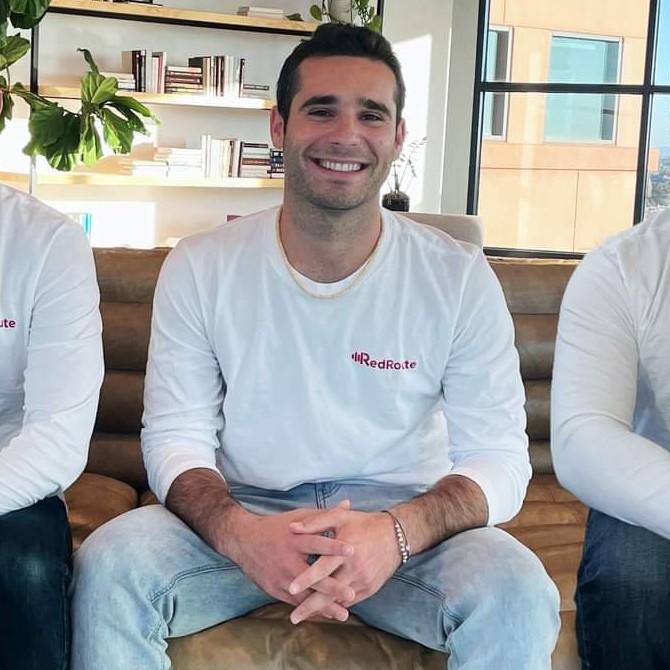
Brian Schiff
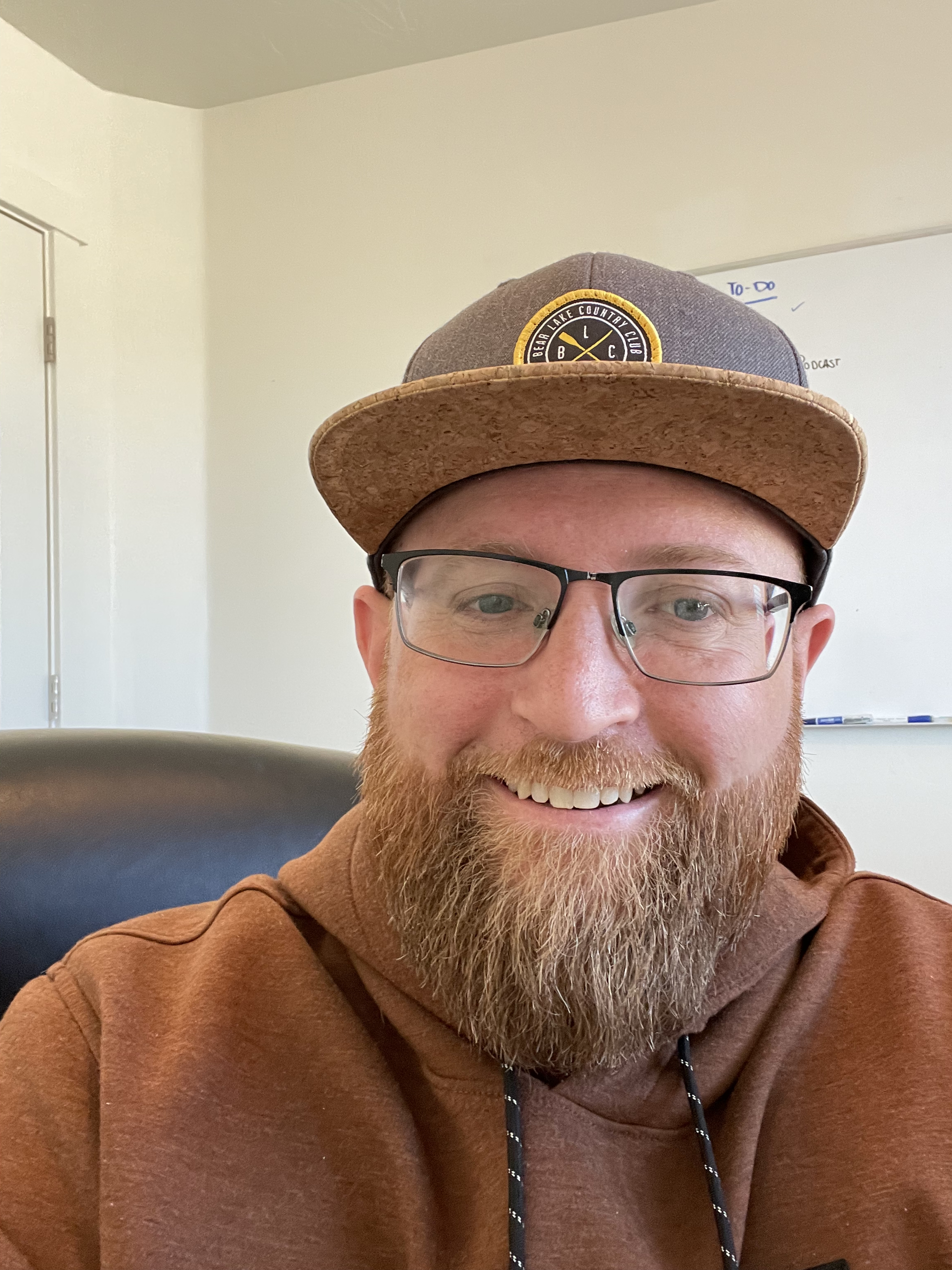
James Gilbert
Today's Guests
